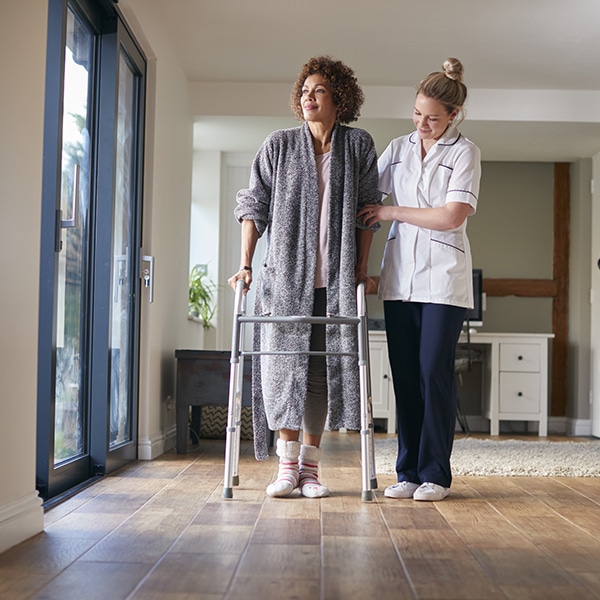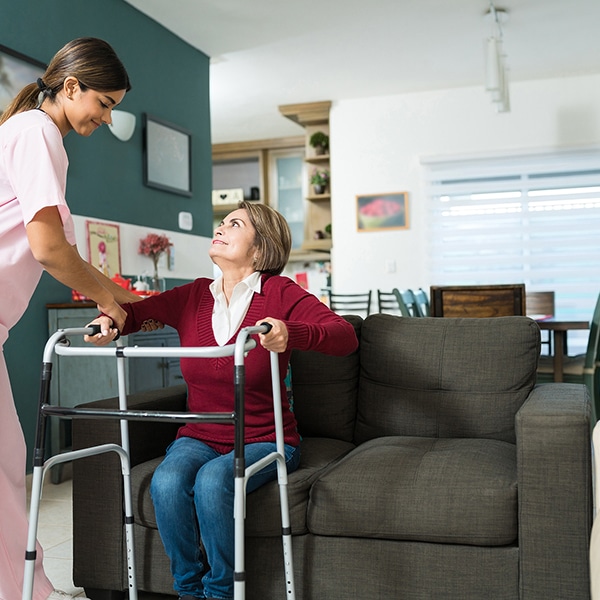We have a variety of compassionate and experienced nurses and caregivers that are dedicated to helping you or your loved one thrive at home. Our team includes; Care Managers, Registered Nurses (RN)Licensed Practical Nurses (LPN), Caregivers, Homemakers, (Companion Care and Personal Care), Certified Nurse assistants (CNA), Certified Medication Technicians (CMT), and Home Health Aides (HHA). We offer visiting nurses and private duty nursing for patients who require skilled nursing care or prefer personalized care from their very own private nurse. It can be challenging to manage illness, injury, or chronic disease at home. The personal attention of a home health nurse can make a big difference.
Care at Home offers both short and long visits, frequent or infrequent visits, and short-term or long-term care. Our areas of focus include; Skilled Nursing Care (as directed by your physician), Alzheimer’s & Dementia Care at Home, ALS and Parkinson’s Home Care, 24-hour and Live-in Home Care, Pediatric Care, and Veterans’ Care. We offer Care Management services and will assist in Senior Moving or Downsizing. You’ll love our flexibility and affordability. Choosing the right home care agency is key to optimum health outcomes. With Care at Home, what matters the most is your well-being and achieving your optimal health
Do you or a loved one have ALS or Parkinson’s disease and need some extra help taking care of your daily needs? ALS and Parkinson’s care at home can be an excellent solution to help you stay in your home despite having mobility issues.
What is Parkinson’s and ALS care at home? How long can a person with mobility issues live at home? How can I find the right home care company for myself or my loved one?
We have the answers you need to help you or your loved age in place despite any mobility issues you may have.
There are many things you or a caregiver can do to help a loved one with mobility problems, from modifying the home to assisting with safe transfers between a bed, wheelchair, and toilet or commode to helping them get the exercise that is appropriate for their condition. Some specific ways to help someone with mobility problems include:
Although emotional care is the last item on the list, it’s far from the least important, especially since people with mobility issues may be less likely to go out and socialize, resulting in feelings of loneliness and social isolation. In fact, the Centers for Disease Control and Prevention (CDC) says [1]:
-“Loneliness and social isolation in older adults are serious public health risks affecting a significant number of people in the United States and putting them at risk for dementia and other serious medical conditions.”
ALS and Parkinson’s care at home involves assisting people with personal care activities that have become too difficult to do independently as a result of mobility issues caused by their disease.
Examples of Parkinson’s and ALS care at home include:

Beyond those who have ALS or Parkinson’s disease, others who may benefit from neurological care at home include people with:
Looking for in-home care in the Silver Spring MD area? Learn more about our non-medical home care options including companionship, safety, meal preparation, and more.
Read the kind words from previous clients. Our testimonials and reviews help families discover how dedicated we are to customer satisfaction.

ALS is short for amyotrophic lateral sclerosis, and it is a progressive neurodegenerative disease that affects nerve cells in the brain and spinal cord [2]. Over time, a person’s brain loses connection with their muscles. As the disease advances and voluntary muscle action is progressively affected, people may lose the ability to move, eat, speak, and breathe.
While research into what causes ALS is continuing, there is not yet a treatment or cure to stop the progression of ALS.
“Parkinson's disease is a progressive nervous system disorder that affects movement. Symptoms start gradually, sometimes starting with a barely noticeable tremor in just one hand. Tremors are common, but the disorder also commonly causes stiffness or slowing of movement…Although Parkinson's disease can't be cured, medications might significantly improve your symptoms.”
Symptoms of Parkinson’s may include:
Learn how Care at Home will make a difference in the life of a senior you love. Read more about what we value and our mission. This drives the process we use to provide the best service possible.
Your loved one may resist in-home care, so it’s important for you to know what to look for and when to seek out Parkinson’s or ALS care at home. Here are some signs that your loved one may benefit from mobility care at home:
A person with ALS, Parkinson’s, or another degenerative mobility disease may be able to live at home for the rest of their lives with the right kind and amount of assistance.
Finding a home care agency for ALS and Parkinson’s care at home may seem like a daunting task, but we’ve provided you with some questions to ask as you interview potential home care agencies [4]:
Ready to get started? Click below and fill out our form. We will connect with you, answer your questions, and provide information on how home care works.
Licensed as a Residential Service Agency (RSA) by Maryland Department of Health and Mental Hygiene, Office of Health Care Quality. State License Number R4621.
Serving Anne Arundel County, Baltimore County, Howard County, Prince George’s County & Montgomery County.